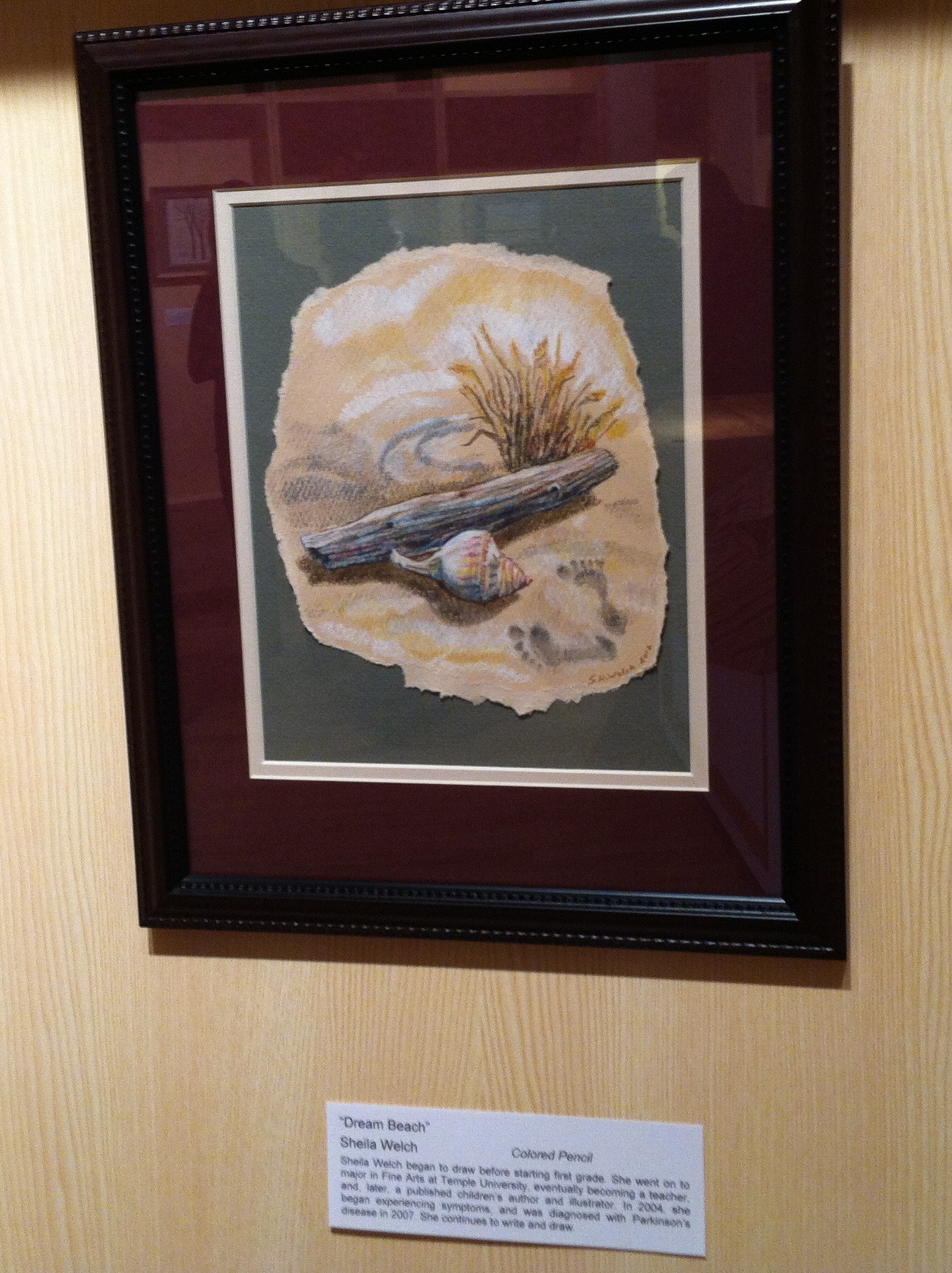I was extremely flattered when author and illustrator Sheila Welch asked me to participate in a book festival she was putting together in Freeport, Ill, and oh so disappointed to have to say no: Freeport is far away from Chicago and had no public transportation options. As you are about to find out from this guest post, Sheila Welch is one determined and resourceful woman, reluctant to take no for an answer. If my Seeing Eye dog Hanni and I took a commuter train as far west as it goes, she said she and her husband Eric could pick us up and drive us the rest of the way.
That car ride back in 2008 gave us a lot of time to talk, and we’ve stayed in touch ever since. I recently asked Sheila to write a guest post on what it’s been like to continue her career as an artist after being diagnosed with Parkinson’s Disease. No surprise here: she rose to the challenge.
The positively best therapy available for me
by Sheila K. Welch
The puzzling symptoms began a decade ago. In the fall of 2004, I had trouble autographing books. Strange. My mother could write her name with a flourish in her late 80s. I noticed, while drawing illustrations, certain movements were awkward and difficult. A few months later, I developed a slight tremor in my right hand.

“Waiting to Forget” is available at namelos press
My family doctor seemed confident that it was nothing serious, and I wanted to believe her. By the spring of 2007, however, waving, clapping, brushing my teeth, quick sketching, handwriting, and typing had all become either impossible or laborious tasks. I could sign my name, but only if I did it slowly and deliberately. And only if no one was watching.
Something was obviously wrong. I suspected Parkinson’s. My husband and I had a dear friend who’d had early onset Parkinson’s Disease (PD), so I was acquainted with this progressively debilitating condition. I went to a neurologist and he told me that I definitely had PD.
Living with Parkinson’s is a balancing act. Medications and exercises have been developed to control many of the symptoms. However, the medications alter brain chemistry and can result in nasty side effects such as extreme drowsiness, and, with prolonged usage, involuntary movements and psychosis.
My future looked bleak. Feeling myself losing abilities that had come naturally and easily for so long, I went into creative overdrive: I revised one novel manuscript. Wrote several stories. Finished revisions on a chapter book. Made illustrated dummy books.
Next I completed a novel that was close to my heart. Several of our children were adopted at school age, and they were the inspiration for WAITING TO FORGET, published by namelos in 2011. Kirkus Book Reviews describes it as “a poignant, realistic tale of child-survivors.” Bank Street College and Pennsylvania School Library Association have included it on their best-books-of-the-year lists.
While working with namelos to get WAITING TO FORGET published, I wrote a picture book manuscript and began sketching illustrations. On New Year’s Day last year, I resolved to work
on a memoir for my family. One hundred words a day added up to 36,500 by December 31.
This spring, I’m doing rough sketches for one of my manuscripts and working on a major revision of a novel. I also created two drawings for an exhibition appropriately called “Art over Adversity.”
While all of these projects take far longer than they would have before my Parkinson’s diagnosis, I’ve discovered that the creative process improves my mood, and that helps me feel better

Sheila’s painting “Dream Beach” was displayed at
the “Art over Adversity” exhibition for Parkinson’s awareness month.
physically. Stress exacerbates all the symptoms of Parkinson’s, but when I’m involved in illustrating a book or I’m writing a short story, the stress level drops.
Equally important: I’ve learned to modify and adapt. I still do presentations at schools and conferences, but I don’t do live demonstrations of my illustrations — I display a sketch I’ve brought from home. To avoid the stress of travel, I use Skype to interact with kids. When the local library hosted the launch of my novel, I offered pre-autographed books for sale.
I’m incredibly fortunate to have my husband Eric. He drives me everywhere, solves my computer issues, and does the household chores. With his help, I have the time and energy to be creative. Our seven children have all been super supportive. The youngest, whose early life was similar to that of my characters in WAITING TO FORGET, now lives in Texas. He has read the novel and tells me that it’s a “real, true” story, which is my most treasured review.
A few weeks ago, I began treatment with a more powerful medication for Parkinson’s disease, and now I can use my right hand to touch type. There’s talk in the PD world of a new medication that might be neuro-protective, but in the meantime, I will happily stick with the positively best therapy available for me — drawing and writing.
Is this book available in alternative format?
On another note, I’d like to e-mail you a piece of writing but don’t know your address.
Have you checked into Dragon Dictation? You talk and it types. I have numbness, nerve damage and pain in my right hand. I used the first version for PC’s that came out in the 90’s for many years. Then my hard drive fried. The 2nd version couldn’t “understand” my southern accent. Frustrated, I learned to type using only my left hand, not fast but it works. I’ve heard that the newest incarnation of Dragon is great. It can’t paint but might help you with manuscript writing. Although it sounds like you’re doing fine, good luck.
Alexis and Kim,
Thanks for your comments, I’m going to contact Sheila and make sure she reads them – if she can’t respond to them here via the blog I’ll do that for her, just need to contact her first, as I don’t know the answers to your questions!
As for contacting me, Alexis, I don’t want to leave my email address here for hear of spammers and the like. I think if you go to my web site http://www.bethfinke.com there is a link to “contact Beth.” After I hit the “publish” button on this blog response I’ll go to the web site myself and double-check.
Yup, it’s there. Just hit the “contact Beth” button and you’ll be put into an email message to me.
….another interesting and amazing person!!! Thank God there is art over adversity as therapy. Good for her! Her book looks great..
Reading your blog inspires and suggests strategies for adapting and organizing our lives to accomplish our goals and gifts. Beautiful. Thanks again.
I agree! I just loved the part where Sheila figured out she could sign books *before* an appearance, a fairly simple answer but at the same time oh so clever!
What’s Sheila’s picture book about?
Thanks so much, Beth! This was a bit harder to write than I expected it would be.
Thanks to all of you who’ve commented. To answer a few questions –Yes, my book is available in several e-book formats. But, I’ve tried to listen to the audio version (I think that’s with the Kindle), and it is very difficult to understand. If you can’t see, then it’d be better to find someone to read it to you. I will approach my publisher about making it available in a good audio version. 🙂
I have tried Dragon Speak but found it frustrating. Obviously, I’d have to learn if I couldn’t type at all. But as long as I can use my hands — I will stick with typing.
I have two published picture books that I illustrated but did not write. You can find them on Amazon or at Our Child Press.The titles are: IS THAT YOUR SISTER? by Catherine and Sherry Bunin and SOMETHING IN THE AIR by Molly Jones. I hope one of my dummy books becomes a real book someday!
Thanks again!
Thank you for sharing, Sheila. I’m in awe at your productivity–you’re a great role model!
Sheila is an inspiration! Thanks for a wonderful interview.
Thanks for replying, Sheila. Hey, I understand how frustrating Dragon Dictate is. Their TV commercials are a crock of you-know-what. I have a version that my husband got for me, collecting dust on a shelf. I’m typing this one handed! You rock girl!
Such an inspiring interview. I’m convinced that if we are supposed to do something, wrapped up in the desire are the means to fufill it.
Thank you, Shelia, for the inspiration!
At risk of picking at nits here, I want to make it clear this was not an *interview* – its a personal essay, written entirely by Sheila Kelly Welch.
An interview would have been much easier for Sheila, as I would have had to prepare the questions and done all the typing! I asked Sheila only one question: what is it like to write and illustrate books while dealing with a chronic disease. Sheila took it from there. I agree with all your comments here, we are all the better for the hard work — both emotionally and physically — Sheila put into this guest post.
Again leaving your blog uplifted and inspired and much to think on. Thanks to you both. Much love.
Sheila, you’ve been an inspiration to me – long before the onset of PD. Your essay – and your books – are now reaching out to others who will benefit from knowing you. Bless you – and you, too, Beth.
Our friendship means so much to me – Love, Lee
Thank you, thank you BOTH for sharing this. It is so easy to get caught up in our own little worlds. It is amazing to see what people with determination can accomplish.
Leave a Response